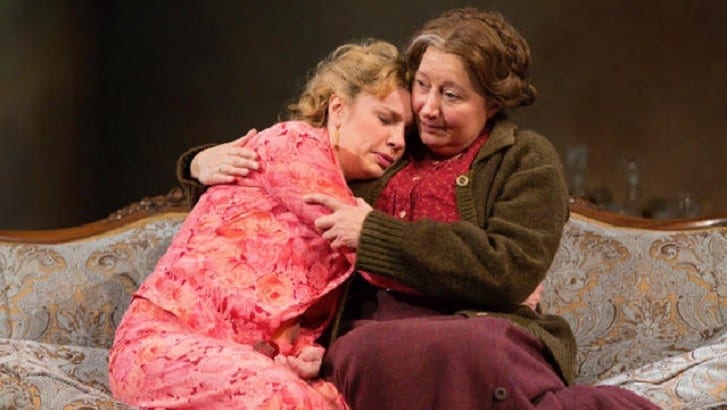
Adrianne Krstansky on the Huntington’s eloquent new revival
Now playing at the Huntington Theatre Company is a lovely, spruced-up revival of Ibsen’s A Doll’s House. Featuring a new adaptation by Bryony Lavery (this is the first time it is being performed in the US), this Doll’s House has a sexy, contemporary edge to it. It also boasts the first must-see performance of the year: the alluring, transcendent Andrea Syglowski as Nora.
Adrianne Krstansky, one of my favorite actresses in Boston, plays Anne-Marie, a nursemaid who left behind her own child to raise Nora and is now raising Nora’s three children. I recently chatted with Krstansky between shows about what sets this Doll’s House apart, its surprising new layer, and why she had to play Anne-Marie, a rare supporting role for her.
What is different about this Doll’s House?
The first thing is [that it’s] stripped down, and I think what it’s trying to expose or explore in a really interesting way is that Ibsen didn’t write the play purely to be a feminist play. What he was really interested in is the way that constructs and systems in our society actually hinder us from living authentic lives. He uses the construct of a marriage in this play, but what I think that he’s really sort of after [is] “is it possible to be authentic and true to yourself and also be in a relationship with another human being?” which, I think, is a really provocative question.
The other new layer of this production is their interracial marriage. That opens up such a fascinating dimension; I imagine that Nora would have received an awful lot of backlash for marrying a black man.
Absolutely. People are talking about this constantly and the ways that especially these classic plays are inclusive of actors of all backgrounds. The one thing that I kept wondering when I was watching it is what does the casting do to the story, or what associations are people making? The question that kept coming to me, too, was what if it had been reversed? What if Nora was African-American and Torvald was white? What would that have done to do the story? Summer Williams, who I’m sure you know, she and I had a conversation about it once and she said something that I thought was so brilliant. She said that obviously what you look like onstage tells a story, your gender, age, ethnic background, and for a while the American theater was so involved with colorblind casting, and she said that what she thinks is the next step is color-conscious casting.
You play Anne-Marie, who is Nora’s children’s nanny, as she was Nora’s nanny. It is such a change for you! We’re used to seeing you in these whirlwind, devastating, production-on-your-shoulders roles. Why was A Doll’s House something you wanted to be a part of?
Two big reasons: I’ve wanted to work with [director] Melia Bensussen for ten years. She’s become a friend, and so that was a big part of it for me. I wanted to be in a room and watch her work. And then, I adore Anne-Marie. I think what I was really interested in, in terms of acting, is that it’s a small part but she needs to function in two ways: She’s in the play for Nora to leave her children, and so the audience knows when she walks out of the door that she can leave and those kids are going to be fine. The other thing is that she provides the background and the history for Nora, and that was really interesting to me, too. How, in so little [stage] time, could I embody the history of this relationship? She’s known her since she was a baby, and that’s a really interesting thing to work on. And I’ll tell you, too, it really struck me during Sheba how blessed I was to have one extraordinary actor after another come onstage. All I had to do was just be in the house and they came in and would just sort of push me from one place to another by their gifts, and I thought, I want to do that. So there are a lot of reasons, but it really centered on Melia, this play, and this kind of great question that came from Sheba about how to bring in the world in these small parts. How do you do that when you have two minutes on stage? It’s really interesting.
Anne-Marie gave up raising her own children so she could raise Nora. That must have such an effect on somebody.
It’s devastating. She got pregnant out of wedlock, and this was this option for women at the time. The amazing thing is that she considered herself lucky. The other interesting realization I had, too, is that the only example Nora had of a woman in her household was Anne-Marie, who had never been married. What must that have been like to be a married person when you’ve never had an example of a mother or a wife in your entire life? It’s so stupid to say that Ibsen’s such a good playwright, but he’s so good! [laughs]
A DOLL’S HOUSE. THROUGH 2.5 AT THE HUNTINGTON THEATRE COMPANY, 264 HUNTINGTON AVE., BOSTON. HUNTINGTONTHEATRE.ORG
Theater critic for TheaterMania & WBUR’s TheArtery | Theater Editor for DigBoston | film and music critic for EDGE Media | Boston Theater Critics Association.

